Illinois Baptist




“Destroy this temple and I will raise it up again in three days,” Jesus said as he drove profiteers from the temple grounds in Jerusalem. He was foreshadowing his own death, burial, and resurrection. Today at the western wall of the Temple Mount stand wailing rabbis and curious tourists who still seek the Messiah. And nearby, 56 Baptists from Illinois are on the journey of a lifetime, following their Savior’s footsteps.
COMMENTARY
Do we need another Bible translation?


Nate Adams
BY MEREDITH FLYNNChicago | An IBSA church has filed a federal lawsuit against the City of Chicago, which is enforcing a zoning ordinance that won’t allow the church to purchase its building near the University of Illinois-Chicago campus.
“Agonizing” is how Nathan Carter, pastor of Immanuel Baptist Church, described the decision to either seek other meeting space or file the lawsuit. His congregation has met in its current location since 2011, and was set to close on the purchase of the building last summer, when city officials blocked the sale because they determined Immanuel had not established legal use.
P. 2
Help wanted: mediator






Reporter’s Notebook, Eric Reed

P. 6
Table Talk, Daniel Darling
P. 13
On average, pastors are older than they were 25 years ago. Among the reasons: longer life expectancy, more “second career clergy,” and the challenge of raising up younger leaders.
– Barna ResearchIn 2017, the median age of Protestant clergy is 54, compared to 44 in 1992.
The mentoring challenge 1992 2017 1992 2017 1992 2017 1992 2017
15% 43% 35% 18% 33% 6% 17%
– Barna Research, March 2017
Giving by IBSA churches as of 3/10/17
$1,116,174
Budget Goal: $1,211,539
Received to date in 2016: $1,113,299
2017 Goal: $6.3 Million
Editor - Eric Reed
Graphic Designer - Kris Kell
Contributing Editor - Lisa Sergent
Editorial Contributor - Meredith Flynn
The general telephone number for IBSA is (217) 786-2600. For questions about subscriptions, articles, or upcoming events, contact the Illinois Baptist at (217) 391-3119 or IllinoisBaptist@IBSA.org

The Illinois Baptist is seeking news from IBSA churches. E-mail us at IllinoisBaptist@IBSA.org to tell us about special events and new ministry staff.

POSTMASTER: The Illinois Baptist is owned and published every three weeks by the Illinois Baptist State Association, 3085 Stevenson Drive, Springfield, Illinois 62703-4440. Subscriptions are free to Illinois Baptists. Subscribe online at IBSA.org
 NATE ADAMS
NATE ADAMS
Like most Americans, I’ve always respected founding father Thomas Jefferson. But I was surprised, and frankly disappointed, to learn recently that in the latter years of his life, Jefferson actually constructed his own version of the Bible. He did so by literally cutting and pasting, with razor and glue, numerous sections of the New Testament, intentionally omitting the miracles and any mentions of the supernatural, including the resurrection of Jesus.
To be fair, Jefferson apparently didn’t refer to his reconstruction as a Bible, but rather titled it “The Life and Morals of Jesus of Nazareth.” Yet over the years it has come to be commonly known as “The Jefferson Bible.”
In fact, from 1904 into the 1950’s, the Government Printing Office gave all new members of Congress a copy of the Jefferson Bible, and that practice was resumed by a private publisher in 1997. The American Humanist Association published its own edition of the Jefferson Bible in 2013, adding passages from the Quran, the Buddhist Sutras, the Book of Mormon, and other works, and distributing it to members of Congress as well as President Obama.
We as Southern Baptists should be truly grateful that, since 2004, our own LifeWay Christian Resources has stewarded its own original Bible translation from the original languages, the Holman Christian Standard Bible. And now, this month, LifeWay is introducing a revised and updated version, renamed simply the Christian Standard Bible (CSB).
Recently I was invited to LifeWay, along with other state executive directors, for an overview presentation of the new translation. In fact, it was there that the Jefferson Bible was used as an illustration of what can happen when God’s Word is not stewarded carefully, and faithfully. In the CSB, LifeWay has sought to balance the two most important aspects of Bible translation: accuracy and readability.
I came away from that presentation greatly encouraged, but also greatly challenged. You see, I also learned during this presentation that Bible ownership is not really the main problem today. 88% of American households own a Bible, and the average number of Bibles per household is 4.7. The real problem is that only 37% of Americans read the Bible once a week or more. With the CSB, LifeWay’s goal is not to sell more Bibles; it is to grow the number of people who read the Bible, and are spiritually transformed by it.
LifeWay has carefully studied the activities linked to true spiritual growth. And the number one activity contributing to spiritual growth is Bible reading (91%), followed by church attendance (87%), personal prayer life (85%), and being mentored by another mature believer (81%).
By providing a freshly updated translation, LifeWay is seeking to grow the number of people engaged in the activity that most often leads to spiritual growth—reading the Bible. In doing so, they have relentlessly preserved accuracy, calling on some of the world’s finest Bible scholars to serve on the translation committee. Yet they haven’t sacrificed readability. Rather, they have sought to carefully balance the two.
So I came home from LifeWay with a new Bible. I don’t really need one. I’m the son of a pastor and a school librarian, and I worked in Christian publishing for almost 20 years. I already have way more Bibles than the 4.7 average per household.
But this new Bible gives me a fresh incentive to delve more deeply and more frequently into God’s Word. It gives me a renewed appreciation for our friends at LifeWay who faithfully steward this translation. And it gives me a reason to give others a new copy of the Bible, and to pray that our reading of it will bring the true spiritual growth that God desires.
Nate Adams is executive director of the Illinois Baptist State Association. Respond at IllinoisBaptist@IBSA.org.

The goal of the Christian Standard Bible is not to increase Bible ownership, but Bible readership.
Continued from page 1

The main issue is parking; the Chicago Zoning Ordinance requires religious assemblies to have a certain number of parking spaces based on how many people they’re able to seat. Immanuel needs 19 spaces to comply with the ordinance, but like many organizations in their neighborhood, the church utilizes street parking. Immanuel and the law firm representing them, Mauck & Baker, are arguing that the ordinance violates the Religious Land Use and Institutionalized Persons Act (RLUIPA) by requiring stricter standards of religious assemblies than for other organizations.
The space at 1443 W. Roosevelt had been rented by another church previously. Churches are a permitted use in the zoning, and the City’s building department gave Immanuel an occupancy permit in 2011. City officials assured Carter the sale wouldn’t be blocked despite the church’s use of street parking. But the City returned a different verdict in July 2016, informing Carter “the church still needed to meet the city’s parking requirements and that the city must determine if a religious assembly use is something it wants to promote on a commercial corridor such as Roosevelt Road,” according to a press release from Mauck & Baker.

The church’s ensuing lawsuit was a “last resort,” said the pastor. “We’ve been courteous and kind throughout the process and not adversarial, seeking to bend over backwards to meet their demands. We have our alderman’s support.”
Plus, Carter continued, “We have many of the same goals for the neighborhood as the City does. We’ve communicated that if they don’t fight it, then we won’t seek damages or fees. [The suit is] framed in such a way that

they can admit they are bound by the letter of a current zoning ordinance, but then point out how that zoning ordinance is federally illegal (because of RLUIPA) by requiring more parking spots for religious assembly than it does for non-religious assembly uses that courts have determined are comparable.”




Carter referred to a sign on the door of his local library, which clearly states the library has no parking and patrons are to park on the street. City ordinances also state “live theater venues” with fewer than 150 seats need no parking, nor do libraries or cultural exhibits within the first 4,000 feet. Mauck & Baker is arguing Immanuel meets both of these requirements: their building seats 146 people and has less than 4,000 square feet.
Carter said the church is praying they can settle the suit within the next month, but if the City decides to continue to fight the purchase, the process could be a lengthy one.
Still, he said, the church sensed the Lord leading in this direction, albeit a somewhat frightening one. “Since 2005 our church has had a vision for being a long-term, stable gospel presence in our specific area of the city—a cluster of neighborhoods that surround the University of Illinois at Chicago,” Carter said. After meeting in four rented locations over the years and doing an exhaustive search of their community for other spaces, the purchase of their current building seems like a strategic decision.
“If the Lord closes this door, we have no doubt that he will open up another one,” Carter said. “But at the moment this was the only one that was cracked open, and there are scary lights coming from behind it, but we sensed the Lord wanted us to knock.”
Illinois Baptist Disaster Relief teams responded in the wake of tornadoes that tore across the state Feb. 28, leaving several communities to pick up the pieces. Volunteer teams worked largely on chainsaw projects, removing damaged limbs and clearing debris.
In Elkville, located 20 minutes north of Carbondale, volunteers from Metro East, Saline, and Williamson Baptist Associations responded to needs in that community and nearby Vergennes and Ava after a tornado cut a wide swath of damage across two states before ending near Christopher, Ill. Don Kragness, a Disaster Relief “blue cap” supervisor and member of Third Baptist in Marion, told local TV station WSIL, “We are here, basically, because we love Jesus and we want to serve him, and the best way we know how to serve him is to help people when they’re in need.”
FBC Elkville served as a headquarters for community response to the tornado; the church helped relocate families and made sure they had necessary clean-up supplies, and is continuing to distribute resources to those in need.
A Disaster Relief team from Greater Wabash Association also responded to needs in the Crossville area, and Franklin Association lent their Disaster Relief shower trailer to the recovery efforts.
In northern Illinois, volunteers worked in Naplate and near the town of Ottawa, where two people were killed and homes were destroyed by a tornado that produced wind speeds of 155 mph. Disaster Relief workers from Three Rivers Association assessed damage in the area, and Streator Baptist Camp housed volunteers who came to serve.
Illinois Baptist Disaster Relief has more than 1,700 trained volunteers who serve as part of the Southern Baptist Convention’s Disaster Relief ministry—the third largest relief agency in the U.S. For more information about upcoming Disaster Relief training opportunities in Illinois, go to IBSA.org/dr.

Planned Parenthood’s refusal of an offer from President Donald Trump to maintain their federal funding if they stop providing abortions proves the organization is “the central agency of the culture of death in this society,” said Albert Mohler, president of The Southern Baptist Theological Seminary.

After President Trump’s offer made news earlier this month, Planned Parenthood President Cecile Richards tweeted her organization “is proud to provide abortion—a necessary service that’s as vital to our mission as birth control or cancer screenings.” Mohler responded on his daily podcast that the decision shows Planned Parenthood’s “values are the values of abortion….To an extent that they will put at risk half a billion dollars of taxpayer money in annual funding because they are so committed to abortion.”
Islam is the world’s fastest-growing religion and will be the largest by 2070 if it continues to grow at the current rate, according to a study by Pew Research. According to Pew’s numbers, the number of Muslims in the world will increase by 73% between 2010 and 2050, while the number of Christians will grow by 35%. At those rates, Christians will outnumber Muslims by less than 200,000 in 2050, and will be overtaken as the world’s largest religion by 2070.
Springfield | As the 100th Illinois General Assembly meets in session at the Capitol, legislators could consider at any time House Bill 40, which reinstates taxpayer-funded abortions for Medicaid recipients and adds abortion coverage to state employees’ insurance plans. But the bill isn’t the only one of concern to Christians and conservatives. The Illinois Family Institute has compiled a list of possible actions currently in committee, and two that have moved on to more advanced stages of the legislative process:
House Bill 312, which had a hearing before the Health Care Licenses Committee scheduled for March 15, allows “full prescrip-
tive authority” for Advanced Practice Registered Nurses. For example, if the bill passes, nurses would be allowed to write prescriptions for RU-486, known as the abortion pill.
Senate Bill 7, which passed Feb. 28 in the Illinois Senate, adds five additional landbased casinos in Illinois; increases electronic gambling; expands gambling positions at existing casinos from 1,200 to 1,600; and gives Chicago a perpetual casino license with 4,000 positions. The bill now awaits action by the Illinois House.
For a list of bills on topics of interest to Christian voters, go to IllinoisBaptist.org.
– Illinois Family Institute, Illinois General Assembly

Chicago | An advertising campaign launched March 13 to help combat human trafficking in Illinois. For four weeks, 20 digital billboards in Chicago and at O’Hare Airport will direct people to the National Human Trafficking Hotline for help and resources.
Illinois Lieutenant Governor Evelyn Sanguinetti and other state officials unveiled the campaign at a news conference in downtown Chicago. “The statistics are simply unbelievable,” Sanguinetti said. “As we speak there are 21 million people worldwide who live in modern-day slavery.”
In 2016, trafficking was reported in all 50 states, she said, with 198 cases in Illinois.
Illinois Governor Bruce Rauner signed legislation in 2016 to create a task force to study
the problem of human trafficking in Illinois and to formulate a plan to address it. The group will report its findings to the General Assembly by June 30.
IBSA also has a five-member task force ready to equip churches with anti-trafficking resources. For more information, go to IBSA. org/missions and click on Human Trafficking in the right column.
– State Journal-Register, BusinessWire.com

Aaron and Melissa Klein (above), the Oregon business owners fined $135,000 for refusing to provide a wedding cake for a same-sex ceremony, took their case to the Oregon Court of Appeals March 2.

“We just want the government to tolerate and accept differences of opinion, so we can continue to follow our faith,” said Melissa Klein, who with her husband operated Sweet Cakes by Melissa. “We hope that, even if people have different beliefs from us, that they will show each other tolerance and that we can peacefully live together and still follow our faith. That’s all we want.”
– Baptist Press, The Telegraph, The Washington Times
Get breaking news in The Briefing online, posted every Tuesday at www.ib2news.org.
Nashville, Tenn. | After a March 13 meeting, SBC leaders Frank Page and Russell Moore issued a statement saying they “fully support” one another, following several weeks of controversy surrounding Moore, president of the Ethics and Religious Liberty Commission.
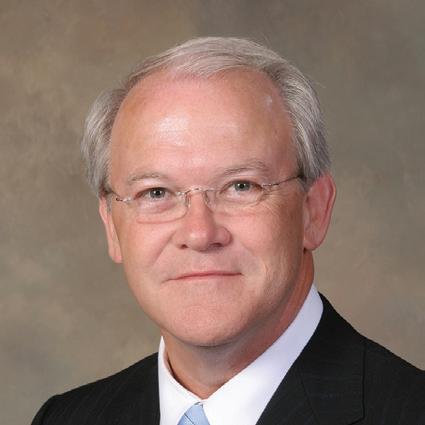

Moore and Page, CEO of the Southern Baptist Executive Committee, met for two hours to, in Page’s words to a Washington Post reporter, “find bridge-building solutions to an unnecessary divide that has been created across the landscape of our Southern Baptist network of churches.” Moore has come under fire for his anti-Donald Trump comments during the presidential election, as well the ERLC’s position on a New Jersey Islamic group’s right to build a mosque.
A Post story titled “Could Southern Baptist Russell Moore lose his job?” created a social media frenzy prior to the meeting, but Page told Baptist Press he planned on “bridgebuilding” with Moore with no anticipation of requesting a resignation. He also said he told the reporter, Sarah Pulliam Bailey, that he has “no authority over Dr. Moore; that is vested in his board of trustees.”
Bailey tweeted in clarification less than two hours after her story was published, “Nothing in my story suggests Moore might be fired. SBC dynamics are more complicated. [Plus] the story is complicated (surprise!)”
Following their meeting, Page and Moore released a joint statement that read in part, “We met as colleagues committed to the same priorities of proclaiming the gospel to every man, woman, boy, and girl while also addressing biblical and gospel issues on a wide range of topics to a culture that seems to have lost its way—issues ranging from religious liberty and racial reconciliation to Kingdom diversity and the sanctity of human life from the womb to the grave.
“...We fully support one another and look forward to working together on behalf of Southern Baptists in the years to come.”
The meeting between Page and Moore came less than a month after Executive Committee trustees approved two studies that will explore conflict within the denomination that is causing churches to temporarily withhold their giving through the Cooperative Program, or to consider doing so. Bailey’s article reported more than 100 SBC churches “have threatened to cut off financial support for the SBC’s umbrella fund.”
Prestonwood Baptist Church in Plano, Texas, announced last month it would escrow $1 million in CP giving due to “various significant positions taken by the leadership of the Ethics & Religious Liberty Commission.” Speaking about the decision, Prestonwood Pastor Jack Graham told Louisiana’s Baptist Message newspaper he is “not angry at the SBC, and neither are our people, and I’m not working to start a movement to fire anyone.”
Graham expressed a desire for his church to remain a cooperating partner with the SBC, but cited “uneasiness” among church leaders about the “disconnect between some of our denominational leaders and our churches.” An overwhelming majority of white evangelical voters chose Trump in last fall’s election, despite strong words against the candidate from Moore and some other evangelical leaders during the campaign.
At their February meeting, the Executive Committee (EC) voted to appoint an ad hoc committee to “study and recommend redemptive solutions to the current reality in Southern Baptist life of churches’ either escrowing or discontinuing Cooperative Program funds, with the report being brought back to the September 2017 Executive Committee meeting.”

A separate study was also approved, instructing EC officers to explore how the activities of SBC entities could adversely affect stewardship.
Executive Committee Chairman Stephen Rummage said earlier this month on the SBC This Week podcast that EC staff had reported more letters, calls, and e-mails from people considering defunding or withholding Cooperative Program funds over the ERLC’s actions than for “any other issue in memory.” Additionally, Roger S. Oldham, EC vice president for convention communications and relations, told Baptist Press the EC office has processed 49 requests from churches to withdraw from the SBC over the past year, up from the usual annual total of a half dozen or so.
Moore told BP, “As a servant of our churches, we are happy to work with the Executive Committee, and more broadly, grateful to be able to serve our churches daily, whether by answering their questions, providing resources and assistance, or standing alongside them in the public square contending for the fundamental issues of life, family, and religious liberty.”
– From Baptist Press reports
With the Southern Baptist Pastors’ Conference less than three months away, the blog which helped launch the movement to retool the annual event is shining a light on this year’s speakers. SBC Voices, the blog edited by Pastors’ Conference President Dave Miller, has produced short videos and interviews to highlight the 12 pastors of smaller to average-sized SBC churches who will take the stage in Phoenix, including Illinois’ Michael Allen and David Choi. Allen pastors Uptown Baptist Church and Choi leads Church of the Beloved. Both congregations are in Chicago.
In his video interview, Allen asked Baptists to “pray that God does something special” at this year’s conference, which will focus on the book of Philippians and is scheduled for June 11-12.
“I pray that this will not just be a one-time thing,” he said, “but this might be something new, a new direction that our Convention goes in terms of the Pastors’ Conference—just hearing from other guys that are faithfully laboring in their fields and then bringing the fruits of the harvest to us, to enrich all of our lives together.”
It was announced in February that four SBC leaders will give testimonies during the conference of how their lives were shaped by smaller membership churches, including SBC President Steve Gaines, past presidents Fred Luter and Johnny Hunt, and North Carolina pastor J.D. Greear.

The SBC Executive Committee and the North American Mission Board are working together to better connect with pastors between the ages of 25 and 45 through the creation of a new young leaders’ network.
“I know there are thousands of young pastors who have a great contribution to make to our Southern Baptist family,” said NAMB President Kevin Ezell. “We want to serve them better and let them know they are loved, valued, and needed.”
The young leaders’ initiative, which will launch this summer, will be headed by Jonathan Akin, one of the leaders of the Baptist21 network of young Southern Baptist pastors and leaders.
– SBC Voices, Baptist Press

The next decade will be the most important in the history of the nation, Gaines told Baptist editors and state convention heads. “Just look at the election we have just been through. America is divided. I have never seen such an election in my 40 years of voting. I am praying for a mighty revival, a movement of God on our land.”

Revival
“The last time it occurred was the Jesus Movement of the early to mid-1970s. That’s when we as a denomination reported the largest number of baptisms in our history. Many missionaries and pastors and church staff members came out of that movement and changed America. It can happen again, and that is my prayer.”
Younger leaders

“I do believe that this new, younger generation will respond when we older men reach out to them…. State conventions need to be proactive and reach out, embrace them, cultivate them. You know, it’s far easier to talk about someone than it is to talk to them. When you talk to them you get on their level, you empathize with them. And that’s what it’s going to take.”
It seems a fair question, especially following the loquacious and public presidency of Ronnie Floyd. Steve Gaines, by comparison, is almost invisible. This is not a criticism of Gaines, that he would have a different style as Southern Baptist Convention president. That is to be expected. Each president makes his own way and leads from his own strengths. But Gaines’s less public style leaves us wondering: What is Steve Gaines doing?

Perhaps focusing on issues that we just haven’t heard about yet.
Floyd wrote. A lot. Almost every week Floyd published thoughts on righting the denomination and meeting the culture conflict head-on. He quickly assumed a statesman position for his two years in office, urging support for missions and the Cooperative Program. We came to rely on his thoughtful, well-reasoned analysis of current events.
Gaines, on the other hand, has spoken for publication rarely. He offered a few comments encouraging Southern Baptists to pray for the election and then the incoming Trump Administration. And in February Gaines urged prayer for revival in America. But it’s his comment on the complaints about the Ethics and Religious Liberty Commission and its president Russell Moore that, we hope, gives a glimpse at Gaines’s work behind the curtain.
“I hope the kind of talk we have been hearing is not the direction in which we are going. I hope Russell will remain in his position and that we have reconciliation with a lot of people,” Gaines said to denominational leaders and editors in Los Angeles. His comment came almost simultaneously with the announcement by Dallas-area pastor Jack Graham that his megachurch, Prestonwood Baptist, would be holding in escrow its sizable offering through the Cooperative Program. Graham expressed concerns about the direction of the SBC and the ERLC, in particular, after an election cycle marked by Moore’s anti-Trump tweets, his ongoing interest in refugees, and the “friend of the court” support of a freedom of religion case, in which both the ERLC and the International Mission Board opposed onerous government regulations placed on a New Jersey mosque.
Southern Baptists do not need another era of suspicion, doubt, and sometime demagoguery. Our mission cause is too important to withhold funding over ancillary anxieties. The reconciliation that Gaines spoke about requires behind-the-scenes diplomacy and skillful mediation. That’s what we hope Gaines is doing, even if we never hear about it publicly.

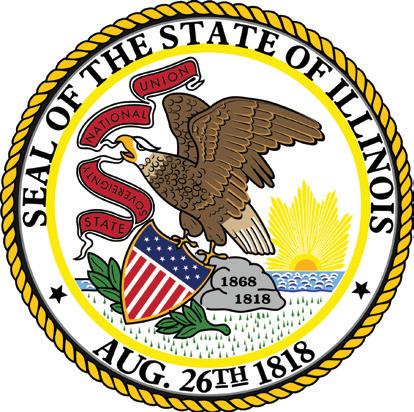
HB 40 removes all prohibitions on taxpayer-funded abortion throughout all nine months of pregnancy under Medicaid and removes the ban from state employees’ insurance policies paying for abortions. Because a half million have been added to the Medicaid roll in the last 5 years, we could see 15,000 or more babies slaughtered with our tax dollars each year!
Please call your state representative and urge him/her to oppose HB 40. If you don’t know who your state representative is, please call us at 708-781-9328.
Rescue those who are unjustly sentenced to death; don’t stand back and let them die. Don’t try to disclaim responsibility by saying you didn’t know about it. For God, who knows all hearts, knows yours, and he knows you knew! And he will reward everyone according to his deeds.
—Proverbs 24:11-12 (Living Bible)
For more information and updates, please visit illinoisfamily.org.

On a chilly morning beside the Jordan River, IBSA’s Pat Pajak encouraged the Illinois pastors and spouses touring Israel with him to “follow the dust of your Rabbi.” The ancient phrase described the privilege accounted students who walked closely behind their Jewish teachers. How much more so is it a privilege for those who follow Jesus, Pajak said. Stay close to him. Moments later, many of them were bapitized in the Jordan in the place where it is believed John the Baptist baptized Jesus.

On this inspiring journey, Lindsay McDonald of Casey served as lead photographer for the Illinois Baptist. “Israel was not one of the places I had dreamed of going. It was my husband’s dream, since he was a boy hearing his grandparents talk about travelling there. Once we arrived though, the Lord opened my eyes to the beauty of the land and the historical and spiritual significance of the sites we visited daily.”
On these pages, at the time when we contemplate the events leading to Calvary, McDonald and more of the pilgrims share their photos and thoughts about walking in Jesus’ steps.

Our time in Israel reminded me of the reality of lostness around the world. We were among Jews who spent time earnestly praying for the Messiah to come, not understanding that their deliverer has already come. We saw the effects of Muslims who have actively tried to keep the Messiah out of Jerusalem, not understanding that their efforts are in vain. The reality of lostness has always been real, but this trip was a great reminder of the scope of lostness around the world.
Seeing the places where Jesus walked and ministered caused the roots of my faith to sink even more deeply into my heart.
McDONALDFirst Baptist Church, Bethalto
Visiting places so rich in history like Megiddo, Beth She’an, Qumran, and Masada challenged me to draw relevance to the present and to contemplate the future. Yet what proved most meaningful to me was praying at the Wailing Wall. Yes, my God is everywhere, and I strive to pray without ceasing, but I was overcome with bittersweet sentiment as I stood at the base of the ancient stones. Through tearful intercession I pleaded for myself, my family, my church, and my nation. Then using Psalm 122 and Romans 11 as a guide, I prayed for the peace of Jerusalem while wrestling through the mysteries of salvation.
In that holy place between lament and hope, I experienced a palpable impression of the “spirit of stupor” that hangs over those who are still waiting for the Messiah. That taste of the “kindness and severity of God” has not left me since.
Salem First Baptist Church
On Sunday night we went to the Western Wall after supper. It was dark and the Wailing Wall was a busy place. Placing my prayer requests in a small crevice in one of the stones in the wall and praying over it—well, my emotions came to the surface. This is a site that I have seen pictures of most of my life. Now, my hand was touching it.

After returning to our group, I stood staring at that wall, soaking in the sight and thinking that all these people—many of whom are awaiting the Messiah—don’t understand that he’s come.
Maybe I understand a little better Jesus’ words: “As he approached and saw the city, he wept for it, saying, ‘If you knew this day what would bring you peace—but now it is hidden from your eyes’” (Luke 19:41-42, CSB).
HEZEKIAH’S WATER TUNNEL – Pat Pajak described these Illinois church leaders who traversed Hezekiah’s water tunnel as “five brave guys.” (Left to right): Chip Faulkner, Steve Hamrick, Ben Towell, Jamie Willis, Bob Carruthers. Towell is pictured (above left) at the Wailing Wall where pilgrims gather to pray for Jerusalem.
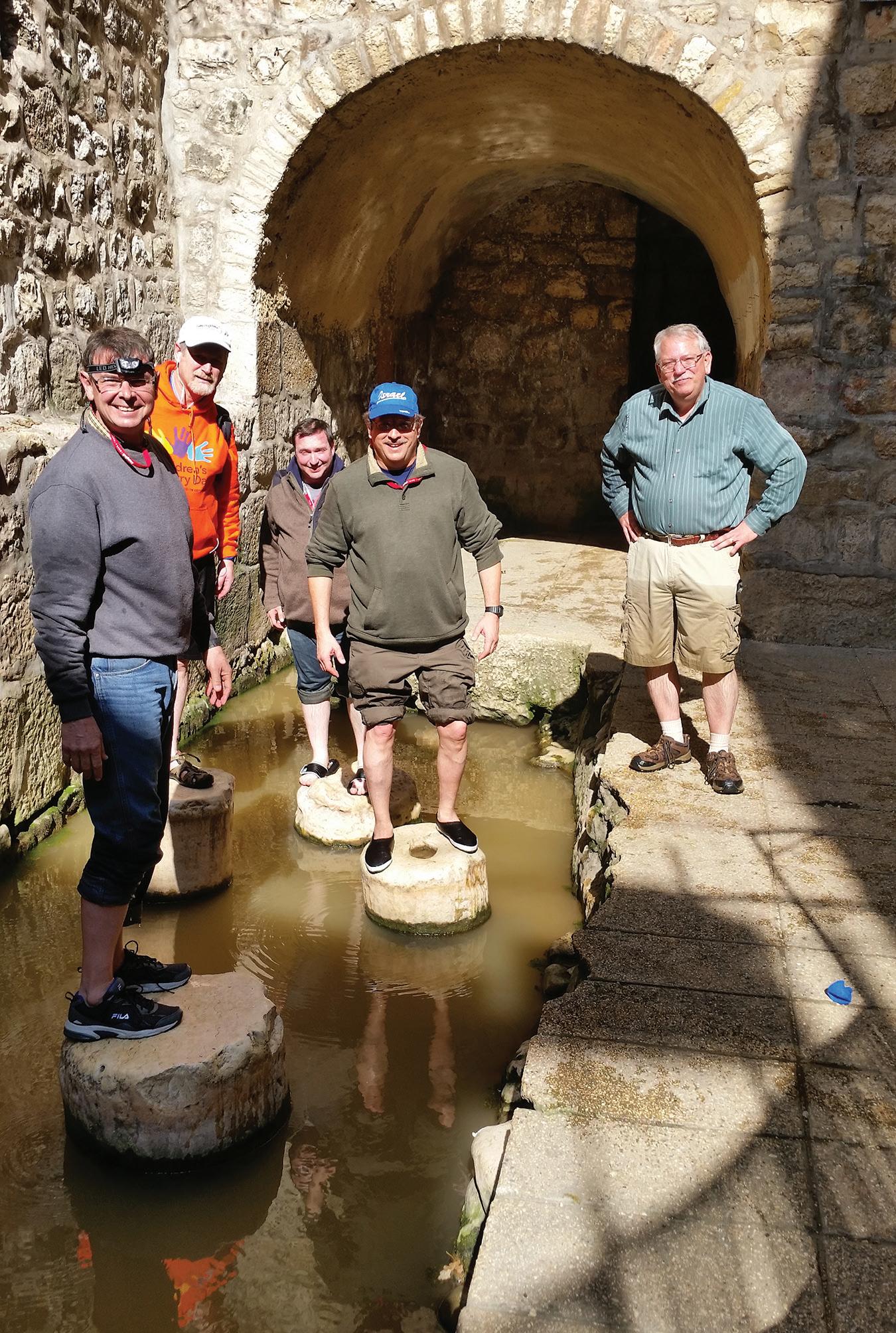
BETH SHE’AN – The ruins of this ancient city in northern Israel are on the Jordan River not far from Nazareth. In Jesus’ time, the city was a thriving center of commerce.

Immanuel Baptist Church, Benton
Imagining the life that Jesus lived in Galilee and all he did in his ministry there was a very touching experience. Having the joy of riding in a fishing boat across the Sea of Galilee, standing where Jesus asked Peter “who do people say that I am?”, walking the Palm Sunday road on a Sunday, and seeing the empty tomb was almost too much for my senses to endure and my mind to comprehend.
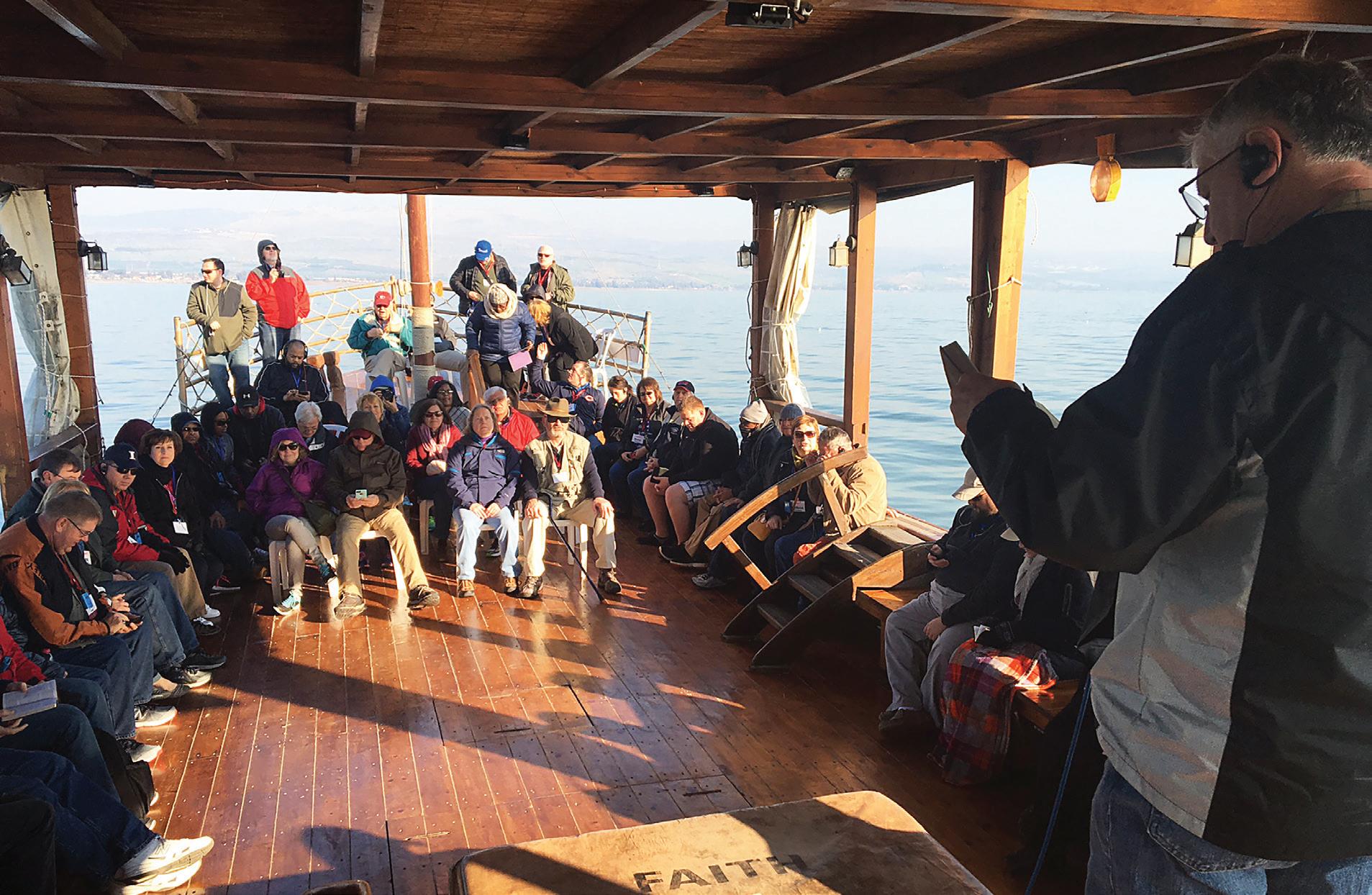
University Baptist Church, Macomb
The history, the truth of God’s design has been unearthed and still continues to be unearthed, literally, and it allows us to see and touch places that God told us about in his Word thousands of years ago. Now that we’re back home, there has not been a song, sermon, or Bible study with our college students where a Scripture is referenced that I am not reminded of our time in Israel. From the steps at the South Gate, to the garden tomb, from the Sea of Galilee to Masada, and everything in between, it all supports God’s Word.
Experiencing the Via Dolorosa and the stations of the cross was moving. Realizing what Jesus had gone through from his betrayal, captivity at Ananias’ house, his trial, the walk down the “way of the cross” (photo above) to Calvary outside the city wall where he was crucified, and to the garden tomb only about 100 yards away was a deeply transformational experience.

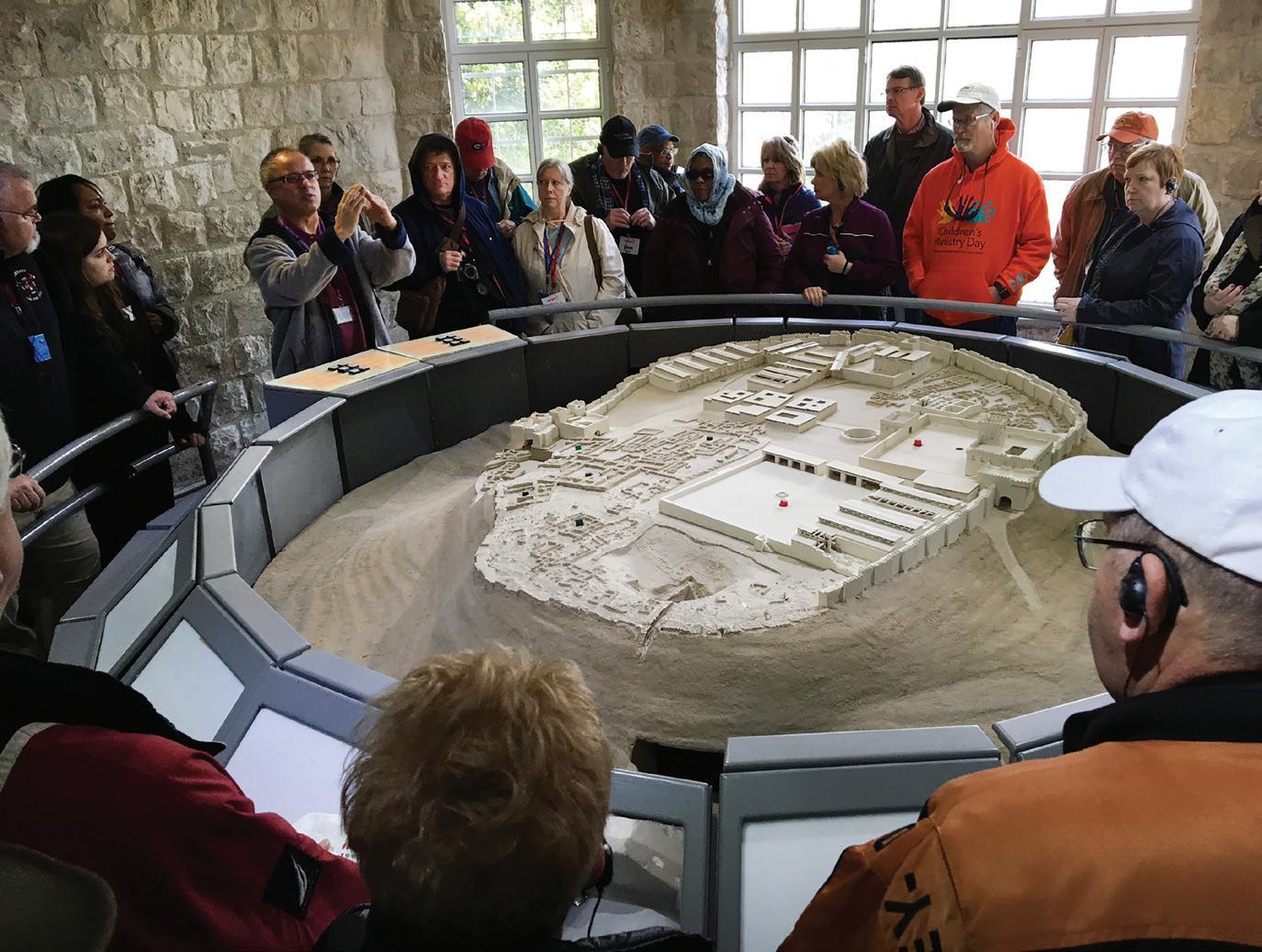

Tabernacle Baptist Church, Decatur
When we visited Mt. Carmel on our first day of touring Israel, we stood on top of the mountain looking toward cities and landmarks in the distance. Our guide pointed toward the valley and told us it was the Valley of Armageddon (photo above). I was awestruck! I could’ve looked at that valley for hours. I told my wife, “We are standing on a mountain where history has been made, and looking at a valley where history WILL be made! And we already know that God is going to win!”

I walked today where Jesus walked, In days of long ago.
I wandered down each path He knew, With reverent step and slow.
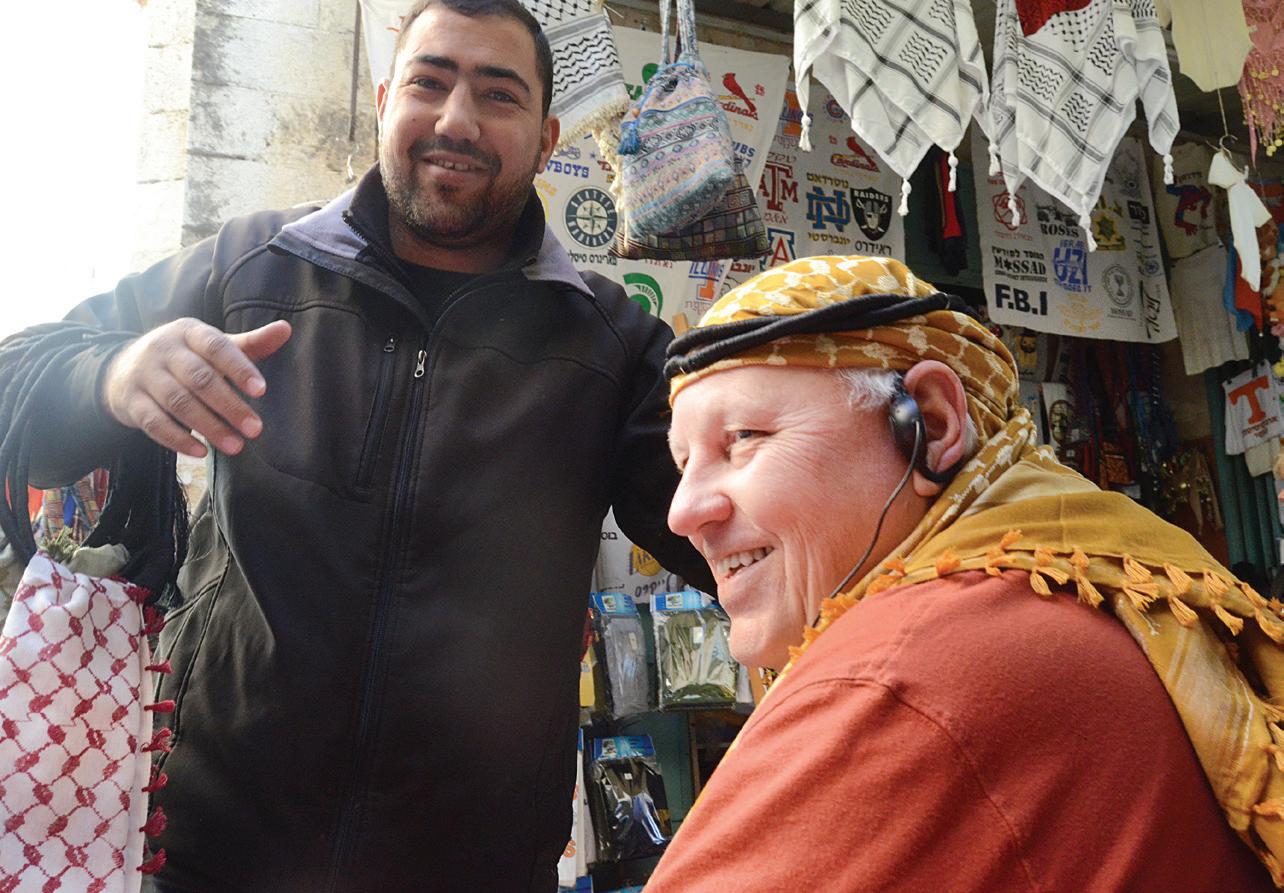
IBSA and Metro Peoria Baptist Association
I thought “the gates of hell” was a metaphor. But it’s a real place, located in northern Israel in the area of Cesarea Philippi (photo at right). In ancient times it was a place of pagan worship primarily for Pan, a greek god of wild creatures. But, more important, it was here in response to Peter’s confession that Jesus said, “Upon this rock I will build my church, and the gates of hell will not prevail against it” (Matthew 16:18). In the midst of a place of evil, idolatry, and darkness, Jesus said he would build his church. Today, the church still serves in the midst of darkness, lostness, and brokenness. The light and hope for our world remains the gospel, and we bear witness to the hope that is only found in Jesus.


I knelt today where Jesus knelt, Where all alone he prayed…
I climbed the Hill of Calvary, Where on the Cross He died…
I walked today where Jesus walked, And felt Him close to me.– From a hymn by Daniel S. Twohig
Across Illinois | More than 1,100 children and grown-up volunteers braved chilly temperatures and the threat of snow Saturday, March 11, to serve through a variety of hands-on missions projects on Children’s Ministry Day.

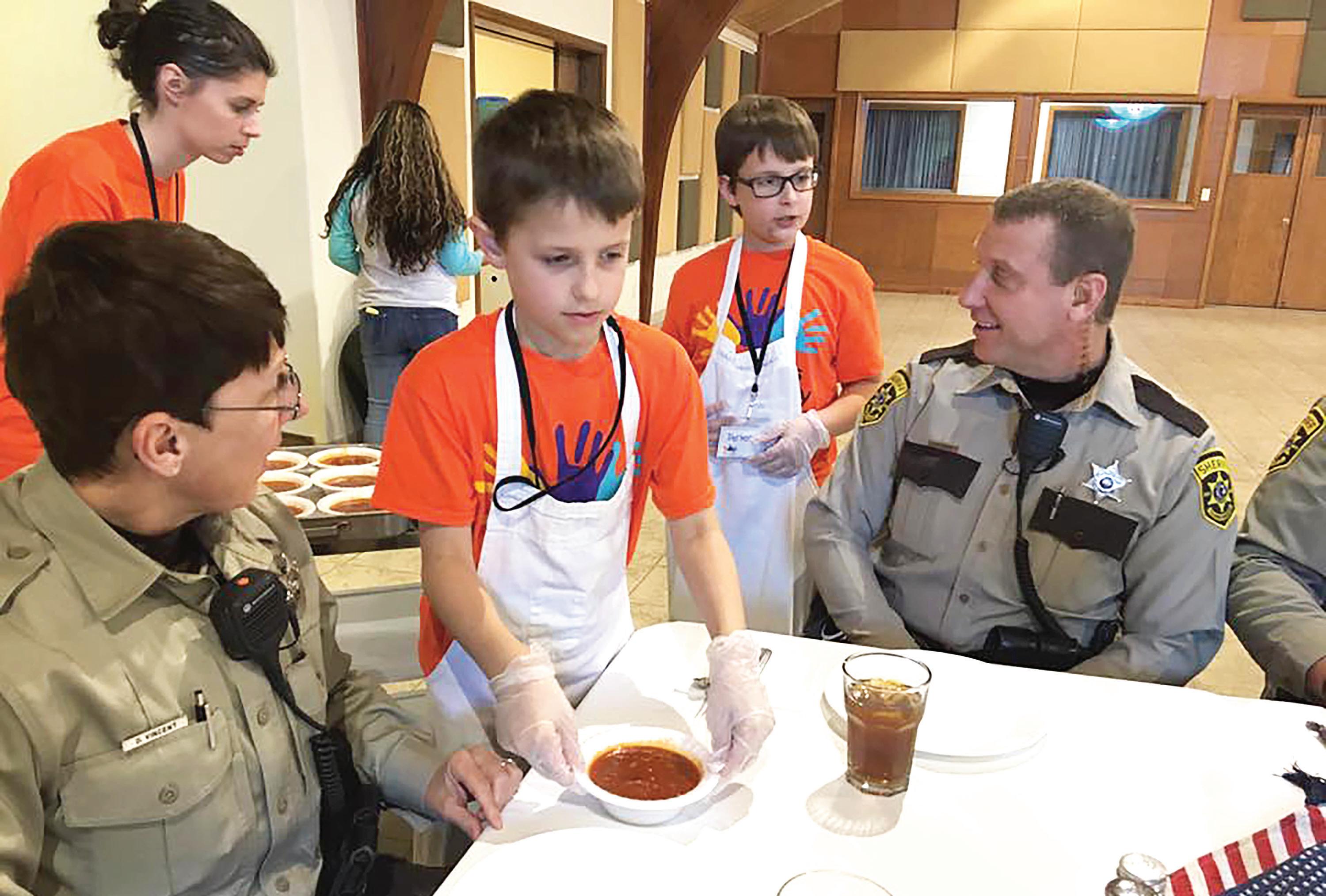
The annual Illinois expression of a national initiative created by Woman’s Missionary Union has expanded to multiple sites over the years. The 2017 projects were held in 15 locations across the state.
Tammy Syers, a leader from First Baptist Church, Carrier Mills, noted how well the kids showed love to the communities they served on Children’s Ministry Day. “They worked very hard and should all sleep well tonight,” she posted on Facebook. “It was a blessing to see the kids asking for jobs to do even after working and serving for hours.”
Throughout the day, group leaders posted news and photos on the official Children’s Ministry Day Facebook page. Their updates provided a play-by-play of the day-long missions emphasis, and after the fact, serve as “praise reports” from a day where kids learned firsthand what it means to be a missionary.
Continued from page 11
In Casey, site coordinator Lindsay McDonald woke up to excited children—her own. “It sure makes a momma’s heart happy when your 6-year-old son wakes up and the first thing he says is ‘What time is Children’s Ministry Day?’ He is so excited to go and serve!”
At Lakeland Baptist Church in Carbondale, Brandon McNeely shared with the young missionaries about how to minister to people in Jesus’ name. He focused on Philippians 2:3-4: “Do nothing from selfish ambition or conceit, but in humility count others more significant than yourselves. Let each of you look not only to his own interests, but also to the interests of others.”
In Sterling and at the other Children’s Ministry Day sites, several churches worked together to accomplish their projects. Emmanuel Baptist, Sterling, posted their thanks for the cooperation: “Thank you to the churches who traveled and joined us. We are so blessed to get to know everyone from Grace Fellowship in Amboy, Calvary Morris, and Cristo es Rey. Thank you for a great day.”
Sharon Carty of Emmanuel Baptist, Carlinville, summarized the day this way: “The children had a great time and truly served as they worked so hard in each of their mission projects. God blessed us in so many ways today as we had the privilege to serve others. Love all those kids and adults too.”




Go to IBSA.org/kids for more upcoming missions opportunities for children and families.

I’ve never really had a moment in my life—39 years—when I wasn’t going to church. My parents got engaged and married in the church. I was born into, raised in, and baptized in church.
My parents, first-generation Christians, were devout churchgoers. We went every time the doors were open—and many times when they weren’t. My father, a plumber, volunteered thousands of man-hours helping build church buildings. My mother volunteered, worked as a secretary, and later served as a preschool teacher.
Since age five, I sat in services: Sunday mornings, Sunday evenings, and Wednesday night prayer meetings. I wasn’t allowed to draw. I was required to sit up straight—no fidgeting. And I wasn’t allowed to fall asleep.
Up through my teenage years, I thought of church as a bit boring. Sure, there were some life-changing, soul-stirring messages at summer camp or a special service. But for most of my life, including my years as a pastor, I did pretty much the same thing every week: singing familiar songs, reading Scripture, listening to a sermon. Ironically, one axiom of my childhood evangelical faith was this: Church is more than the service or a building; it is the called-out people of God, living on mission every day. Church, I was told, will not get you to heaven. Only a personal relationship with God through Jesus Christ will do that.
I still believe this, more strongly now than ever, but I also believe that in some ways church does—or did—save me. It didn’t save me in the ways you might expect: a spectacular Sunday service, a homerun sermon, or a gripping worship set. God’s primary tool to transform my heart was not the conference speaker or the travelling revivalist or the worship concert. Those events were important, but now I realize that, more often, God changed my life using routine worship services in which I sang hymns I didn’t quite understand and heard messages I didn’t quite grasp.
During times of fear and anxiety, I drift back to the words of hope from Martin Luther’s epic hymn, “A Mighty Fortress Is Our God”: And though this world, with devils filled, Should threaten to undo us, We will not fear, for God hath willed His truth to triumph through us.

When I feel insecure, I recall the lines of the Methodist hymn: I stand amazed in the presence Of Jesus the Nazarene, And wonder how he could love me, A sinner, condemned, unclean.
The hymns of the blind poet, Fanny Crosby. The majestic lines from Isaac Watts. The simple melodies of Bill Gaither. These are just a few of the hundreds of hymns that were cemented in my heart from week after week of “boring” church services. As a young child enduring the routines of our Baptist church, I didn’t realize what was happening to me. In his book, “You Are What You Love,” James K. A. Smith talks about the way our hearts are formed:
“There is no formation without repetition. Virtue formation takes practice, and there is no practice that isn’t repetitive. We willingly embrace repetition as a good in all kinds of other sectors of our life— to hone our golf swing, our piano prowess, and our mathematical abilities, for example. If the
sovereign Lord has created us as creatures of habit, why should we think repetition is inimical to our spiritual growth?”
This repetition built in my heart a deep reservoir of theology. And now, as a husband and father, and pastor, whenever I stand and sing these hymns, I can barely contain myself. Some choruses evoke memories: My father serves communion while “Jesus Keep Me Near the Cross” plays faintly in the background. Dad fights back tears as we sing “Jesus Paid It All.”
These rituals train our hearts. We sing to ourselves songs, hymns, and spiritual songs. We hear the gospel preached to us over and over. We lift the cup to our lips and the bread to our tongues remembering, again, our place at the King’s table. Through these practices, God takes our hearts and seals them for his courts above, to paraphrase another hymn writer, Robert Robinson.
Don’t get me wrong. We shouldn’t eschew creativity in the church. We are, after all, “new creation” people. But our creativity should not seek to tell a new story. It should be designed to communicate to our hearts that same, old, wonderful story of salvation.
When I think back on the simple routines that changed my life, I’m encouraged in my own pastoral role. I’m reminded afresh that the work of ministry is not so much about finding new, tantalizing ways to make people excited about Jesus, but about the timeless rituals that shape their hearts.
Daniel Darling is the vice president for communications for the SBC’s Ethics and Religious Liberty Commission. Previously, he served as a senior pastor in the Chicago suburbs. This column is excerpted from Baptist Press.

he Turners have a new foster child!” A wide-eyed 12-year-old walked into church beside the couple, and people began to welcome him.
When God prompts someone in your church to foster a child, how will your church respond? Are preschool, children’s, and youth workers prepared? Will people in your church lovingly support those brave parents and welcome that child?
DIANA DAVIS
Get ready to make a difference. Try some of these fresh ideas:
1. Get prepared. Get an organized support team in place ahead of time to be ready to welcome foster children. Listen to the excellent podcast “The Adopting and Fostering Home” at NAMB.net or iTunes. Send your children’s/youth minister or a key volunteer through your state’s foster care training.
Have a respite plan in place to help absorb foster parents’ weariness. Organize a foster and adoptive parent Christian support group.
2. When a foster parent receives a child, rally around them. Discover immediate needs and help meet them. Loan a car seat. Prepare a care package. Appoint one person to organize some meals.
Remember to allow bonding time. Leave gifts at the door. Arrange a visit only after the foster family says they’re ready for guests. And pray. The day my daughter and son-inlaw picked up their foster children, a church member texted, asking how she could pray. Every week thereafter, she still texts and prays.
3. When the foster child comes to church, make a lasting impression. This could possibly be that child’s only experience in God’s house with God’s people. So, show interest. Talk to the child. Be a friend. Cook the child’s favorite meal or dessert. Give a teen a small Wal-Mart gift card.
Be patient. Show grace if behavioral problems occur. Give the child value by learning his name and calling him by it. Recognize him. And teach your own children to offer friendship, care, and kindness.
The Turners fostered many children over the years. Each child was showered with God’s love by their foster parents…and their church. As God calls church families to foster children in great need, how will your church partner with them?
“To reduce anxiety during our counseling sessions, I’ve asked my associate pastor to fill any awkward silences.”
© 2017 DianaDavis.org
Dominican Republic | It was the enthusiasm of a fellow pastor that encouraged Brent Cloyd to lead his association on a recent mission trip to the Dominican Republic.
Cloyd, director of missions for Greater Wabash Association, first heard about the church planting efforts of a Dominican leader, Pastor Ramon Ortiz, through his friend Keith Halsey, who pastors First Baptist in Raymond.
“Eight years ago [Halsey] met Pastor Ortiz and found him to be a man who was not just a good pastor but a man with a great missionary heart who desired to start churches,” Cloyd said. In February, the DOM took four others from his association to work with Ortiz. They shared the gospel in the communities where the pastor is ministering and worshiped in local churches.
Cloyd and Scott Lambrich, also from Greater Wabash, even had the opportunity to help baptize four new believers.
Cloyd said he hopes the association will participate in future trips
to the DR to help believers who feel led to plant their lives there. The Illinois group visited a mountainous, economically depressed region of the country where IBSA will send a medical team this June.
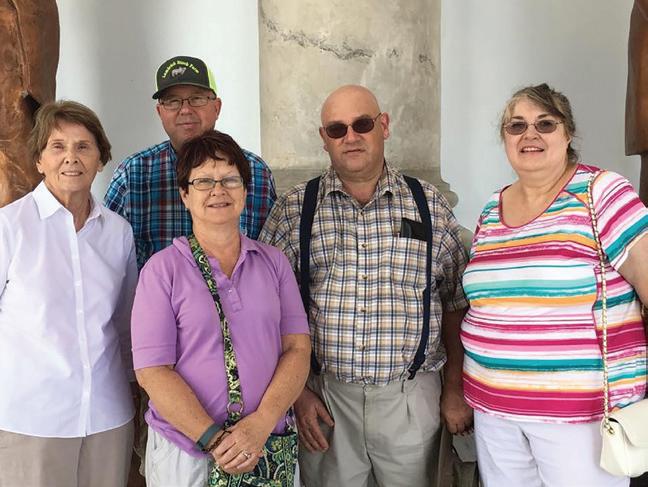
“We are hopeful that there are going to be other opportunities in this area soon and I for one am praying that our association will
SHALL WE GATHER – In a river in the Dominican Republic, Scott Lambrich and Brent Cloyd (third and fourth from left) help Pastor Ramon Ortiz baptize a new believer. Cloyd led a team of five from Greater Wabash Association on a trip to the Caribbean nation in February.
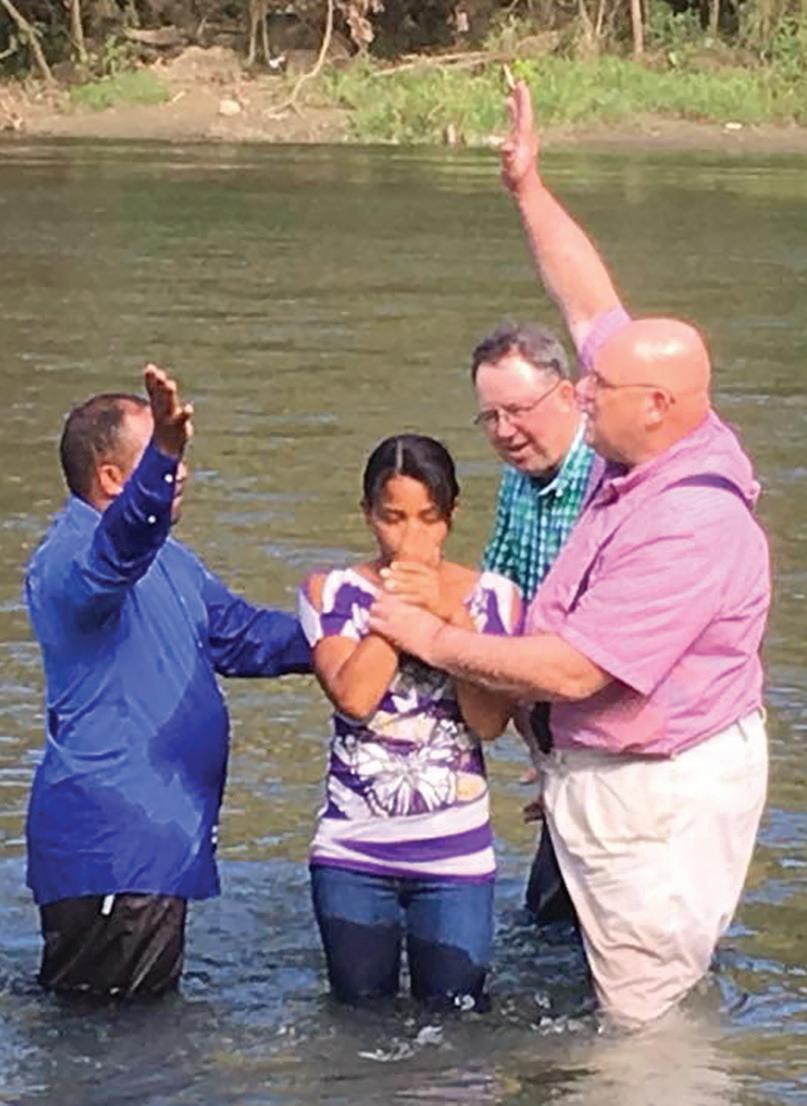
have and take advantage of joining in this work,” Cloyd wrote in a recent newsletter to Greater Wabash churches. “There are opportunities for us to partner with churches in the Dominican in ways that may seem small to us but which are large to them. I hope you will join me in praying for how God might use us in this nation.”
Goodlettsville, Tenn. | Jeff Deasy, IBSA’s associate executive director for the Church Cooperation Team, and his wife, Kathy, were recently recognized for their years of mission service by Parkway Baptist Church in Goodlettsville, Tenn.
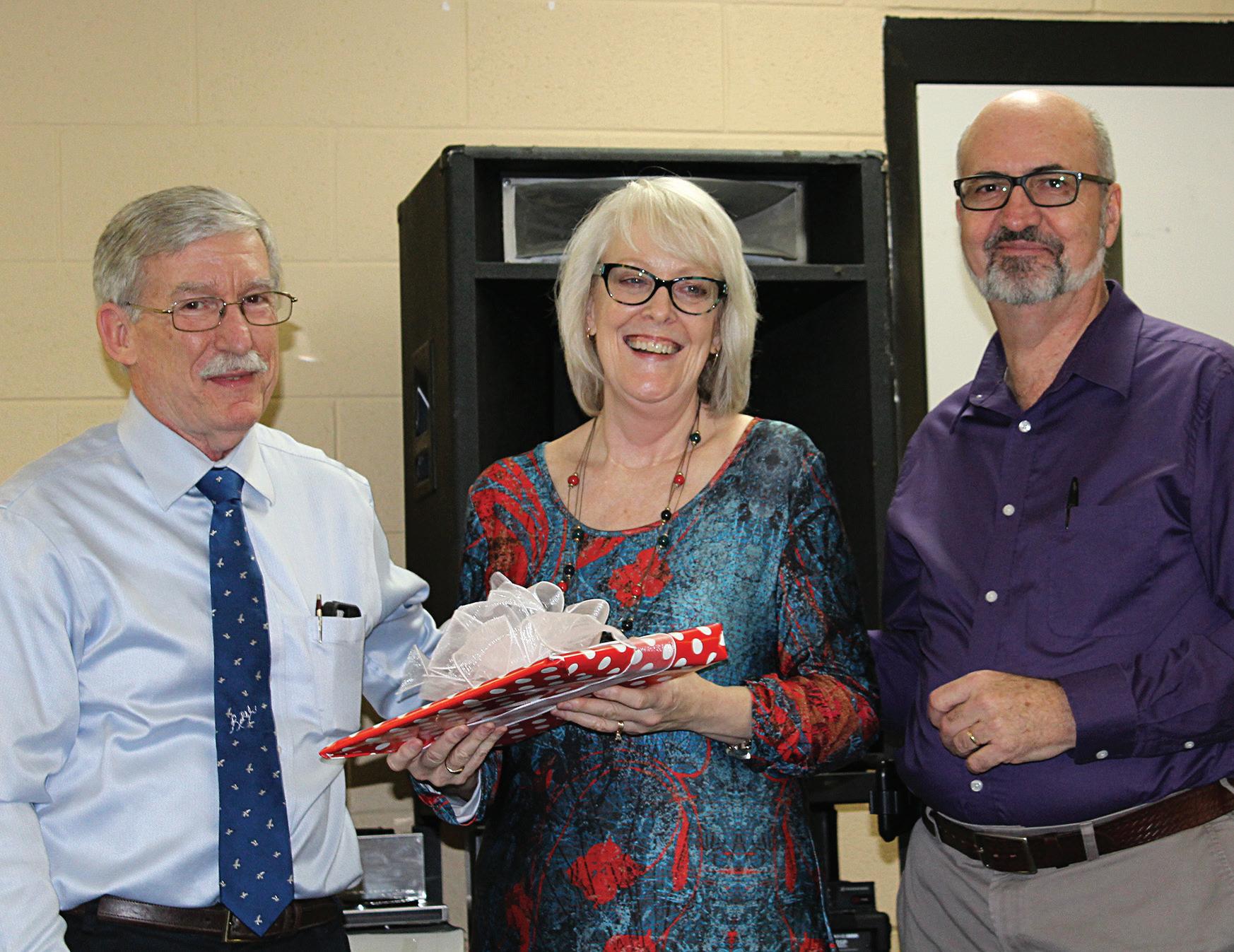
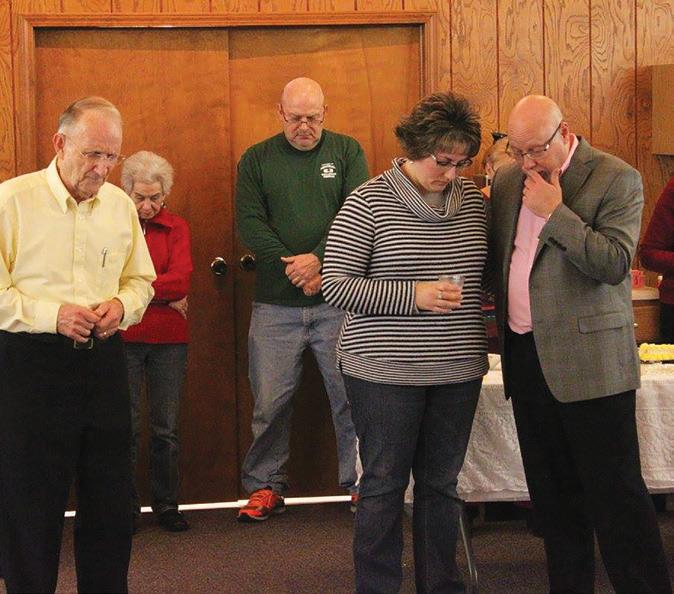
The Deasys, who retired from the International Mission Board in 2015 after serving 20 years in Brazil, Tanzania, and Kenya, once were leaders at the Tennessee church, including serving as organist (Jeff) and pianist (Kathy).
The church held several activities to celebrate the Deasys, including a presentation of a book of memories by Pastor Ralph Hurst (left).
Photo first appeared in the Tennessee Baptist and Reflector
Find more information on ministry positions at IBSA.org/connect
Send NetworkiNg items to IllinoisBaptist@IBSA.org
Baptist Children’s Home and Family Services is seeking couples to serve as houseparents and relief houseparents to adolescents in a group home setting. BCHFS also seeks a single female to serve as a relief houseparent. Applicants must be 21 or older, with high school diploma/GED. Positions are full-time with benefits. Contact melinda.bratcher@bchfs.com, and go to bchfs.com to download the application.
Church of the Cross in Mahomet is seeking a bivocational discipleship coordinator to support and facilitate a culture of disciple-making. E-mail pastor@churchofthecrossmahomet. org or call (217) 586-6764 for more information. Resumés must be submitted by March 24.
Richard “Rick”
Mullan, associate pastor at Friendship Baptist Church in Plainfield, died March 5 at the age of 57. During his ministry, Mullan served churches in Springfield and Fairview Heights, as well as congregations in Florida. A talented musician and guitarist, he had served at Friendship since 1998 and also held roles within IBSA and Three Rivers Baptist Association. He was a graduate of Southwest Baptist University in Bolivar, Mo., and Southwestern Baptist Theological Seminary in Ft. Worth, Texas. Mullan is survived by his wife of 33 years, Lanette; children, Kyrstin and Jonathan; parents, Robert and Beverly; and four siblings.
Kevin Carrothers is the new director of missions for Salem South Baptist Association, headquartered in Mt. Vernon. Carrothers, who serves as president of IBSA, has pastored Rochester First Baptist Church since 2009. He is a graduate of Missouri Baptist University in St. Louis and Southern Illinois University School of Law in Carbondale.

Rochester FBC celebrated Carrothers, his wife, Jennifer, and their children, Ian and Elena, on March 5, presenting them with a hymnal signed by friends and praying over their family (photo above). Carrothers’ first day as DOM is March 20.
Strasburg Baptist Church is seeking a part-time or bivocational pastor with at least two years of ministry experience. Contact Carol Menter at (217) 875-7450 or menterc46@ yahoo.com.
March 31-April 1, April 21-22 Disaster
What: Classes in food prep, mudout, childcare, chaplaincy, and more
Where: March 31-April 1: Pasfield Southern, Springfield; April 21-22: Streator Baptist Camp
Cost: $40 new volunteers, $10 badge renewals, $10 yearly training, $10 overnight stay Info: IBSA.org/dr
March 31, April 1
What: A one-day seminar for pastors and leaders who want to bring new life to their churches; 8:30 a.m.-4 p.m.
Where: March 31: Lake Sallateeska; April 1: Streator Baptist Camp
Contact: SylvanKnobloch@IBSA.org
April 1
VBS Clinic – Northern Illinois
What: Training for this summer’s “Galactic Starveyors” curriculum; 8 a.m. to noon
Where: Broadview Missionary Church Register: IBSA.org/kids
April 3-4
Resilient Call Retreat
What: Training for pastors in building solid relationships; noon Monday to noon Tuesday
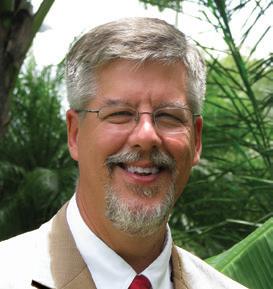
Where: Lake Sallateeska Baptist Camp
Contact: SylvanKnobloch@IBSA.org
April 8
Artful Askers Workshop
What: Grant-writing training in building relationships with funders, resources, and donors

Where: Metro East Baptist Association
Cost: $39, includes materials and lunch
Register: IBSA.org/church_health
April 9
Cooperative Program
Sunday
Info: cpmissions.net
Resources: LisaSergent@IBSA.org

What: A half-hour of leadership training, every third Wednesday from 11:30 a.m.-noon April 19: Do you see anything? Dealing with blindspot and biases, with Mary Selzer May 17: Heads Up—How to stop just going through the motions, by Jane Bishop Info: IBSA.org/women

QAfter listening to your radio show, I want to try to get control of my finances, but I’m afraid to open up the bills. I make about $60,000 a year, but it’s a real struggle just to keep my head above water financially. My checking account is always overdrawn, and I don’t know where to start in catching up. Can you help?
ATrust me, I know it can be scary. But the easiest way to attack this thing is by taking one slow, sure step at a time. Try not to let worry consume you in the process, either.
First, sit down, take a deep breath, and open all the unopened bills. Throw away any duplicates, and keep only the most recent statements and notices. The unknown is always scarier than the known, so facing the bills and cutting that stack in half right off the bat will help reduce a lot of your initial anxiety.
Next, let’s start a debt snowball. List all the debts you owe, from smallest to largest, making one column for the payoff balance, one column for the amount you need to get current on that debt, and one column for the single payment amount when you get current. Total each column— the payoff balance, the amount to get current, and the single payment. I promise it won’t be as bad as you think.
Finally, make a monthly budget. Prioritize your needs, starting with food, utilities, house payments, and transportation. When it comes to your debts, pay as much as you can on the smallest one while making minimum payments on all the others.
You can do this. If you’ll follow my plan, I think you’ll see improvement in several areas of your life and you’ll feel good about the progress you’re making, too!
DAVE RAMSEYQMy mom is 73 years old, and she’s dealing with depression and a few other mental issues. Is it too late for her to get long-term care insurance?
AIt wouldn’t be a big problem if she were healthy. But given her age, and the other struggles you mentioned, I’d check with a good insurance broker to see what’s out there for her.
In the insurance world they call this “making a market.” Will they be able to find a company that will write her in that situation? I can’t give you an accurate answer off the top of my head, because this is a difficult thing. It would probably depend on things like the extent of her depression, how long it’s been manifested, and what it has done in her life.
That’s one of the reasons I’m advising you to see an insurance broker. A broker doesn’t represent just one company; they represent several companies. They can shop around in a given situation, and find someone to write something you might not get written otherwise. They can also shop around for the best possible price, and you get the efficiencies of the marketplace working for you.
God bless you both.
Financial advisor Dave Ramsey is a prolific author and radio host.

QOur worship team is in the process of evaluating our Sunday service to determine how it can be more effective. I’ve heard you speak in defense of a traditional “invitation” at the end of a worship service. But it seems old-fashioned. Why should we consider adding it back in?
AOne of the surprising things I’ve found while visiting churches in Illinois is that many no longer give an invitation during the service. I think some pastors look out at their congregations and see largely the same crowd every week. They’re not expecting visitors to come, and they don’t see a need to call or invite people to receive Jesus Christ as savior.
But calling people to respond to the gospel is part of keeping the main thing the main thing in our churches. Otherwise, it’s easy for us to forget that the church is an instrument that Jesus Christ instituted and promised to build. It’s the organism on the earth today to share the gospel. So, I would urge you to be inviting! And not just in the service, but as part of every ministry your church uses to engage with people in your community.
QMy mentor said as a new pastor I should not make any big changes for a year. But I’m not sure the church can wait that long. We need to fix some things now.
AIt sounds to me like your mentor is wise! If a surgeon tried to do brain surgery, heart surgery, liver surgery, and repair an ingrown toenail all on the same day, he might very well lose the patient. Perhaps fixing the ingrown toenail, which can be very painful and require some time to heal, is the best he can do at first.
At your church, it would be wise to look at some minor short-range changes that could be accomplished in 3-6 months, mid-range changes that can happen in 12-18, and long-range changes for the next 2-3 years. That allows time to research, plan, promote, and secure finances for those changes, and also inform the congregation about what to expect. You will accomplish the needed changes, but in a manner that keeps the church involved and avoids potential conflict.
Pat Pajak is IBSA’s associate executive director for evangelism. Send questions for Pat to IllinoisBaptist@ IBSA.org.
Location: Belleville
Focus: Residents of the Belleville West area and students at Lindenwood University
Characteristics: This community is in need of a new church to serve the needs of Belleville West families, new arrivals to the community, and college students.
Prayer needs: Pray that God would lead a church planter to this region with a heart for a small city and collegians.

Read: Hebrews 11:23-29; Acts 7:17-36
Hall of Fame baseball player Yogi Berra once remarked, “When you come to a fork in the road, take it.” As Moses attained the age of 40, he encountered this proverbial fork in the road.
pinterest.com/illinoisBaptist
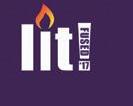

Cross of Christ, a new congregation in Naperville, has a terrific idea that can work anywhere. Take a big board and a bunch of sticky notes to a festival or block party. Ask people to post their responses to this question: “Who is Jesus?” or “What the world needs now is…?” Discuss their answers with them. Invite them to church.
 KEVIN CARROTHERS
KEVIN CARROTHERS
One path, the familiar path, would have kept him in Egypt surrounded by all the comforts and luxuries of Pharaoh’s palace. Having been highly educated in Egyptian culture and wisdom, he proved himself influential in his speech and actions, potentially being groomed to be Pharaoh. The other path was unknown. It was grounded in his Hebrew upbringing, but for the most part this direction seemed fraught with risk and potential solitude.
We all recognize that life is filled with choices to make. The Bible says that Moses made a choice that certainly was not popular with some nor deemed wise by others. However, when examined closely, we find that he was rejecting the pleasures of sin and choosing to follow God obediently. As he rejected the temporal pleasures of the world, he did so by walking away from the familiar. “By faith he left Egypt” (Hebrews 11:27).
When we trust God, we find that his direction often differs from the world’s conventional wisdom. Moses left behind the familiar to follow God, even though he had no idea that 40 years later he would return to Egypt to lead Israel toward the Promised Land.
PRAYER PROMPT: O Lord, what do we need to leave behind, so that we can faithfully follow you? Amen.
Kevin Carrothers serves as director of missions for Salem South Baptist Association and IBSA President.


FREE: Look for 20 summertime outreach ideas in the next issue of Resource, a magazine for IBSA church leaders. The Summer issue will arrive in church mailboxes soon. To order individual subscriptions, free to IBSA church members, contact Communications@IBSA.org. Read the online version at resource.IBSA.org.



30% 68% 2%
of adults in Illinois say there are clear standards for right and wrong say it depends on the situation were unsure.
